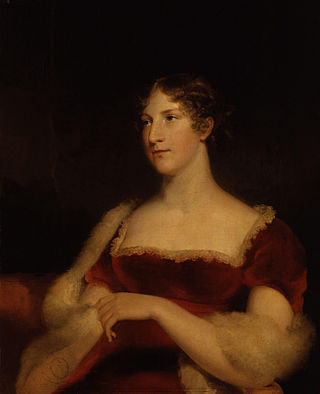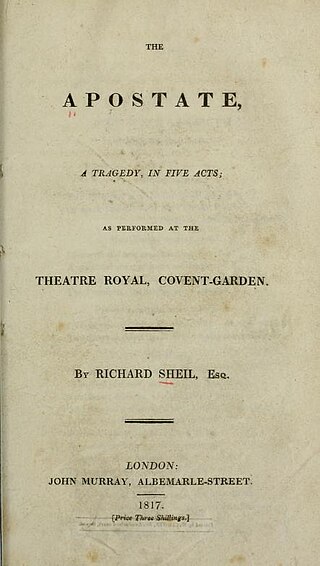Related Research Articles

William Abbot or Abbott was an English actor, and a theatrical manager, both in England and the United States.
The Rose Tattoo is a three-act play written by Tennessee Williams in 1949 and 1950; after its Chicago premiere on December 29, 1950, he made further revisions to the play for its Broadway premiere on February 2, 1951, and its publication by New Directions the following month. A film adaptation was released in 1955. The Rose Tattoo tells the story of an Italian-American widow in Mississippi who has withdrawn from the world after her husband's death and expects her daughter to do the same.

William Charles Macready was an English stage actor.

Elizabeth O'Neill, also Eliza, was an Irish actress.

Richard Lalor Sheil, Irish politician, writer and orator, was born at Drumdowney, Slieverue, County Kilkenny, Ireland. The family was temporarily domiciled at Drumdowney while their new mansion at Bellevue, near Waterford, was under construction.
The Werburgh Street Theatre, also the Saint Werbrugh Street Theatre or the New Theatre, was a seventeenth-century theatre in Dublin, Ireland. Scholars and historians of the subject generally identify it as the "first custom-built theatre in the city," "the only pre-Restoration playhouse outside London," and the first Dublin theatre.
Bellamira: or, The Mistress is a comedy by Sir Charles Sedley, published in 1687, partly modelled on Terence's Eunuchus.

The Constant Couple is a 1699 play by the Irish writer George Farquhar. It is part of the Restoration comedy tradition, and is often described as a sentimental comedy. It marked the first major success of Farquhar's career. A series of comic misunderstandings are triggered when three rivals vie for the hand of the wealthy heiress Lady Lurewell.
Sir Harry Wildair is a 1701 comic play by the Irish writer George Farquhar. It is a sequel to the 1699 hit The Constant Couple, portraying the further adventures of the most popular character from the earlier play.
Hibernia Freed is a 1722 tragedy by the writer William Phillips. It is set during the ninth century during the Viking Invasion of Ireland. It was part of a growing Anglo-Irish interest in traditional Irish history, and part of a tendency to switch tragedy from Ancient Rome or Greece to more native settings.

Love is an 1839 play by the Irish writer James Sheridan Knowles. It premiered at the Theatre Royal, Covent Garden on 4 November 1839 with a cast that included Charles Selby as Prince Frederick, James Vining as Sir Rupert, Alfred Wigan as Sir Conrad, William Payne as Stephen, Ellen Tree as Countess, Emma Brougham as Empress and Lucia Elizabeth Vestris as Catherine. Knowles was paid six hundred pounds for the work by the management of Covent Garden. Mary Shelley praised the play for its "inspiring situations founded on sentiment and passion". It went on to enjoy success in the United States where it became part of the repertoire, being performed at the Broadway Theatre in New York many times in the 1850s. It was celebrated by abolitionists who cheered its anti-slavery theme of a serf falling in love with a countess despite her father's disapproval and the threat of execution.
Retribution is an 1818 British tragedy by the writer John Dillon. It premiered at the Theatre Royal, Covent Garden in London on 1 January 1818. The original London cast included Charles Mayne Young as Veranes, King of Persia, William Macready as Chosroo, Charles Kemble as Hamed, Daniel Egerton as Abdas, William Abbot as Hafiz, Daniel Terry as Suthes, Charles Connor as Sohrab and Elizabeth O'Neill as Zimra.

The Innkeeper's Daughter is an 1817 stage melodrama by the British writer George Soane. It was loosely based on the ballad Mary the Maid of the Inn by Robert Southey. It premiered at the Theatre Royal, Drury Lane in London on 7 April 1817. The original cast included Henry Gattie as Frankland, James William Wallack as Richard, Thomas Cooke as Hans Ketzler, Frances Maria Kelly as Mary and Sarah Harlowe as Marian. The music was composed by Thomas Simpson Cooke. It's Irish debut was at the Crow Street Theatre in Dublin on 19 January 1818.

Fazio is a tragedy by the British writer Henry Hart Milman. It was first published in 1815. An unauthorised adaptation was performed at the Surrey Theatre under the title The Italian Wife. Another unauthorised version was performed at the Theatre Royal, Bath. In 1818 Milman granted permission for the Theatre Royal, Covent Garden to stage the play. It premiered there on 5 February 1818. It starred Charles Kemble as Giraldi Fazio, Elizabeth O'Neill as Bianca, Daniel Egerton as the Duke of Florence, Charles Mathews as Gonsalvo, William Blanchard as Bartolo, Harriet Faucit as Aldabella and Charles Connor as Falsetto. A first Dublin performance took place at the Crow Street Theatre on 6 April 1818. Fanny Kemble later played Bianca in Britain and America, where she appeared at the Park Theatre in 1832. It was revived on both sides of the Atlantic over the following decades.
A Word to the Ladies or A Word for the Ladies is an 1818 comedy play by the British writer James Kenney. It premiered at the Theatre Royal, Covent Garden on 17 December 1818. The original cast included William Macready as Winterland, Charles Mayne Young as Larum, Charles Kemble as Dorrington, Elizabeth Yates as Miss Singleton, Harriet Faucit as Clara Winterland, Charles Connor as Adamant, William Abbot as Young Bowerscourt, William Farren as Old Bowerscourt, John Liston as Silvertongue and John Emery as Snugg.

The Touchstone is an 1817 comedy play by the British writer James Kenney. It premiered at the Theatre Royal, Drury Lane in London on 3 May 1817. The original cast included Charles Holland as Finesse, James William Wallack as Garnish, John Pritt Harley as Paragon, William Dowton as Probe, William Oxberry as Croply, Frances Maria Kelly as Dinah Croply, Sarah Harlowe as Mrs. Fairweather and Frances Alsop as Miss Becky. It's Irish debut was at Dublin's Crow Street Theatre on 16 February 1818.

Charles Connor was an Irish stage actor of the early nineteenth century. Educated at Trinity College Dublin, he was active in Dublin at the Crow Street Theatre during the early stages of his career. He also featured at the Theatre Royal, Bath. He appeared as part of the Theatre Royal, Covent Garden company from 1816 to 1826, where he was considered the resident stage Irishman. His death from apoplexy in St James's Park on 7 October 1826 opened the way for a fresh actor Tyrone Power to take over his parts. The Gentleman's Magazine particularly remembered him for his performances as Sir Lucius O'Trigger in Richard Brinsley Sheridan's The Rivals.

Damon and Pythias is an 1821 tragedy by the Irish writers John Banim and Richard Lalor Sheil. It is based on the Greek legend of Damon and Pythias. It premiered at the Theatre Royal, Covent Garden in London on 28 May 1821. The original cast included William Macready as Damon, Charles Kemble as Pythias, William Abbot as Dionysius, Daniel Egerton as Damocles, Thomas Comer as Procles, Charles Connor as Lucullus and Maria Foote as Hermion. It was widely performed in Ireland and the United States including at the Chestnut Street Theatre in Philadelphia.

Evadne is an 1819 historical tragedy by the Irish writer Richard Lalor Sheil. It premiered at the Theatre Royal, Covent Garden in London on 10 February 1819. The original cast included Elizabeth O'Neill as Evadne,William Macready as Ludovico, William Abbot as the King of Naples, Charles Mayne Young as Colonna, Charles Kemble as Vicentio, Charles Connor as Spalatro and Harriet Faucit as Olivia. Sheil dedicated the published play to his fellow Irish writer Thomas Moore.

The Apostate is an 1817 tragedy by the Irish writer Richard Lalor Sheil. It premiered at the Theatre Royal, Covent Garden on 3 May 1817. The original cast included William Macready as Pescara, Charles Kemble as Hemeya, Charles Mayne Young as Malec, Thomas Comer as Hamy, Charles Murray as Alvarez, Daniel Egerton as Gomez and Elizabeth O'Neill as Florinda. The prologue was spoken by Charles Connor. It was loosely inspired by a 17th century work by the Spanish playwright Pedro Calderón de la Barca. The play was a success, but reviewers generally attributed this to O'Neill's acting rather than Sheil's writing.